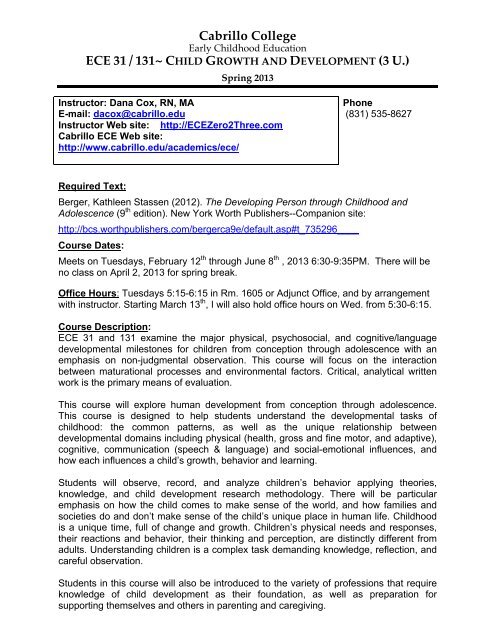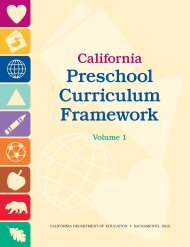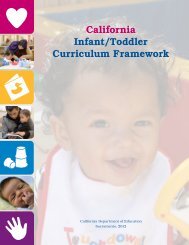Cabrillo College ECE 31 / 131~ C - ECEZero2Three: Dana's Child ...
Cabrillo College ECE 31 / 131~ C - ECEZero2Three: Dana's Child ...
Cabrillo College ECE 31 / 131~ C - ECEZero2Three: Dana's Child ...
Create successful ePaper yourself
Turn your PDF publications into a flip-book with our unique Google optimized e-Paper software.
<strong>Cabrillo</strong> <strong>College</strong><br />
Early <strong>Child</strong>hood Education<br />
<strong>ECE</strong> <strong>31</strong> / 1<strong>31</strong>~ CHILD GROWTH AND DEVELOPMENT (3 U.)<br />
Spring 2013<br />
Instructor: Dana Cox, RN, MA<br />
E-mail: dacox@cabrillo.edu<br />
Instructor Web site: http://<strong>ECE</strong>Zero2Three.com<br />
<strong>Cabrillo</strong> <strong>ECE</strong> Web site:<br />
http://www.cabrillo.edu/academics/ece/<br />
Required Text:<br />
Phone<br />
(8<strong>31</strong>) 535-8627<br />
Berger, Kathleen Stassen (2012). The Developing Person through <strong>Child</strong>hood and<br />
Adolescence (9 th edition). New York Worth Publishers--Companion site:<br />
http://bcs.worthpublishers.com/bergerca9e/default.asp#t_735296____<br />
Course Dates:<br />
Meets on Tuesdays, February 12 th through June 8 th , 2013 6:30-9:35PM. There will be<br />
no class on April 2, 2013 for spring break.<br />
Office Hours: Tuesdays 5:15-6:15 in Rm. 1605 or Adjunct Office, and by arrangement<br />
with instructor. Starting March 13 th , I will also hold office hours on Wed. from 5:30-6:15.<br />
Course Description:<br />
<strong>ECE</strong> <strong>31</strong> and 1<strong>31</strong> examine the major physical, psychosocial, and cognitive/language<br />
developmental milestones for children from conception through adolescence with an<br />
emphasis on non-judgmental observation. This course will focus on the interaction<br />
between maturational processes and environmental factors. Critical, analytical written<br />
work is the primary means of evaluation.<br />
This course will explore human development from conception through adolescence.<br />
This course is designed to help students understand the developmental tasks of<br />
childhood: the common patterns, as well as the unique relationship between<br />
developmental domains including physical (health, gross and fine motor, and adaptive),<br />
cognitive, communication (speech & language) and social-emotional influences, and<br />
how each influences a child’s growth, behavior and learning.<br />
Students will observe, record, and analyze children’s behavior applying theories,<br />
knowledge, and child development research methodology. There will be particular<br />
emphasis on how the child comes to make sense of the world, and how families and<br />
societies do and don’t make sense of the child’s unique place in human life. <strong>Child</strong>hood<br />
is a unique time, full of change and growth. <strong>Child</strong>ren’s physical needs and responses,<br />
their reactions and behavior, their thinking and perception, are distinctly different from<br />
adults. Understanding children is a complex task demanding knowledge, reflection, and<br />
careful observation.<br />
Students in this course will also be introduced to the variety of professions that require<br />
knowledge of child development as their foundation, as well as preparation for<br />
supporting themselves and others in parenting and caregiving.
COURSE SYLLABUS 2<br />
<strong>ECE</strong> <strong>31</strong>/ 1<strong>31</strong> – <strong>Child</strong> Growth and Development Cox<br />
RECOMMENDED PREPARATION for sections taught in an English Format: Eligibility<br />
for ENGL 100 and READ 100.<br />
Core <strong>Cabrillo</strong> Competencies:<br />
Communication - reading, writing, listening, speaking and/or conversing<br />
Critical Thinking and Information Competency - analysis, computation, research,<br />
problem solving<br />
Global Awareness - an appreciation of scientific processes, global systems and civics,<br />
and artistic variety<br />
Personal Responsibility and Professional Development - self-management and selfawareness,<br />
social and physical wellness, workplace skills<br />
Course Structure<br />
This 3 Unit course may be taken for credit as either <strong>ECE</strong> <strong>31</strong> or <strong>ECE</strong> 1<strong>31</strong>. Both <strong>31</strong> and<br />
1<strong>31</strong> receive full <strong>Cabrillo</strong> <strong>College</strong> credit, qualify as part of a financial aid load, permit<br />
students to continue in the Early <strong>Child</strong>hood major, and qualify for State licensing<br />
requirements necessary to work with young children. <strong>ECE</strong> <strong>31</strong>, however, is also<br />
transferable to four-year institutions and fulfills a social science (Area D) graduation<br />
requirement at <strong>Cabrillo</strong>. The only difference between the two options is the nature of the<br />
written assignments. For <strong>ECE</strong> <strong>31</strong>, college level analytic writing is required on all<br />
assignments and some assignments include additional questions for students getting <strong>31</strong><br />
credit. Students must decide between <strong>31</strong> and 1<strong>31</strong> credit during the first week of class.<br />
Students choosing to take the class, as <strong>ECE</strong> 1<strong>31</strong> must give the instructor the<br />
appropriate paperwork by the second class meeting<br />
Course Learning Outcomes :<br />
1. Analyze, compare and contrast major developmental milestones for children from<br />
conception through adolescence in the areas of physical, psychosocial, cognitive,<br />
and language development using standard research methodologies.<br />
2. Analyze how social, cultural, economic, political and historical contexts impact and<br />
affect development.<br />
3. Investigate the importance of the early years, appraise the interaction between<br />
maturational processes and environmental factors and analyze their effects on<br />
various areas of development.<br />
4. Analyze children's development based on detailed, descriptive, non-evaluative written<br />
documentation of child observations.<br />
Course Objectives:<br />
1. Identify and explain the major developmental tasks for children from birth through<br />
adolescence in the areas of physical, social/emotional, and cognitive/language<br />
development.<br />
2. Describe and discuss several of the major cultural and social factors that influence<br />
prenatal development, birth, identity development and the life experiences of young<br />
children.<br />
2
COURSE SYLLABUS 3<br />
<strong>ECE</strong> <strong>31</strong>/ 1<strong>31</strong> – <strong>Child</strong> Growth and Development Cox<br />
3. Examine, explain and compare major theoretical frameworks that relate to the study<br />
of child development<br />
4. Investigate and explain sources of developmental change; describe biological and<br />
environmental factors; and demonstrate knowledge of current research findings on<br />
the interaction between maturation and experience, including risk factors, and<br />
reasons for disturbances in the developmental process.<br />
5. Observe children of various ages from infancy through adolescence and<br />
demonstrate objectivity in detailed, descriptive, non-evaluative written<br />
documentation of observations.<br />
6. Apply developmental theories to data collected through interviews and observations<br />
of children at various ages and stages using investigative research methodologies.<br />
7. Describe and explain observations in relationship to readings, lecture presentations<br />
and answers to questions.<br />
8. Examine and evaluate the role of family, caregivers and teachers in facilitating<br />
children’s development.<br />
9. Examine and evaluate the role of play and its relationship to development at various<br />
stages.<br />
10. Investigate and explain the process of bilingual development in children at various<br />
stages.<br />
11. Utilize self-assessment and self-reflection to examine and analyze content of the<br />
course.<br />
Course Content<br />
1. Introduction to developmental thought.<br />
2. Major current and historical theoretical frameworks of child development.<br />
3. The child as a member of a specific family, culture and social structure.<br />
4. Genetics, heredity, conception, prenatal development and birth: interaction between<br />
biological and prenatal environmental factors.<br />
5. Investigative research methods: interviews, observation, documentation, analysis,<br />
presentation of findings; questions of ethics, bias, and validity of research.<br />
6. The art and practice of objective observation and documentation<br />
7. Applying theory and developmental norms to analyze observations of children at<br />
various ages and stages of development.<br />
8. <strong>Child</strong> development: infants, toddlers, play-years, middle childhood and<br />
adolescence; including but not limited to physical, social/emotional, cognitive,<br />
language, special needs, risk factors, and care and education at each level.<br />
9. Characteristics of typical and atypical development at various stages.<br />
10. Monolingual and bilingual development: theories of language learning and<br />
bilingualism.<br />
11. Developmental issues: identity and sense of self; gender roles; sexual development;<br />
peer groups; schooling.<br />
12. The role and influence of family, caregivers and childcare programs.<br />
13. Contemporary social issues that impact children’s development.<br />
3
COURSE SYLLABUS 4<br />
<strong>ECE</strong> <strong>31</strong>/ 1<strong>31</strong> – <strong>Child</strong> Growth and Development Cox<br />
Course Information/ Academic Policies:<br />
http://www.cabrillo.edu/publications/catalog/current/wrap/academicpolicies.pdf<br />
1. Late assignments will not be accepted without prior permission from the course<br />
instructors.<br />
2. All assignments, unless otherwise noted (ie: journal entries), are to be submitted<br />
by computer or typewriter. You must email or talk to the instructor if you need to<br />
have a handwriting accommodation made.<br />
3. The last day to drop with no grade placed on permanent record is 2/25/13. The<br />
last day to drop classes with option of “W” grade is 5/11/13 NOTE: It is the<br />
student’s responsibility to take these actions through the Admissions<br />
Office.<br />
4. Content, assignments, and exams presented in this course syllabus are<br />
subject to change by the course instructor in order to adapt and individualize<br />
learning, and/or accommodate student needs and/or guest speakers.<br />
5. Students are expected to adhere to a code of conduct that requires honest and<br />
ethical academic behavior and respect for others as well as for the learning<br />
environment.<br />
6. The college policy on attendance, as stated in the catalog is: students missing<br />
one more class hour than the unit value for a particular course, without making<br />
prior arrangements may, at the instructor’s option be dropped without possibility<br />
of credit.<br />
7. Students with disabilities and/or other special needs are highly encouraged to<br />
talk with the instructor about what accommodations they need and/or seek the<br />
services of the DSPS http://www.cabrillo.edu/services/dsps/<br />
Course Requirements and Assignments:<br />
1. Regular attendance, preparation and participation in the class.<br />
<strong>Cabrillo</strong> attendance policy that does not allow for more than three class absences for a<br />
3 U. course. Tardiness and/or leaving class early will result in a loss of points per class.<br />
A total of 10 points can be given for each class attended and for your participation. You<br />
will be responsible for signing in during class.<br />
It is important that you find your “voice” in classroom activities and discussions of ideas,<br />
critiquing your own and others’ ideas, and finding ways to engage in ideas, concepts,<br />
theories and issues raised through class discussions. Discussions and activities may<br />
sometimes raise controversial topics that have personally impacted you and/or your<br />
fellow students, their families and communities. To facilitate open, honest and<br />
respectful discussions – even when we are questioning, critical, or in disagreement with<br />
one another – it is important that we all support our opinions with examples from the<br />
reading, class discussion, and/or personal experiences, and show how they are<br />
connected to the theories, concepts, ideas, and issues we are learning. It is also<br />
important that we all take care to give each other a chance to be heard during<br />
discussions.<br />
4
COURSE SYLLABUS 5<br />
<strong>ECE</strong> <strong>31</strong>/ 1<strong>31</strong> – <strong>Child</strong> Growth and Development Cox<br />
2. Assigned readings as required. See course outline for weekly assigned<br />
Students are expected to complete required readings prior to the class meeting and<br />
contribute to topic discussions. Reading may also include handouts provided by the<br />
instructor.<br />
3. Read, Reflect and Respond (R & R) Entries.<br />
Complete 10 read, reflect, and respond entries that demonstrate your understanding of<br />
the text. Topics to reflect on will be included for each read and response, however you<br />
may choose another key topic to reflect on, and may also include your response to<br />
lectures and/or other classroom activities. The goal of this assignment is to apply (and<br />
for <strong>31</strong> students—analsye) the course material. I am not looking for a “summary” of the<br />
reading. This assignment is more about quality than quantity, however each read reflect<br />
should be at least 1-typed page.<br />
This is the beginning of taking theory and research into your practice (your current<br />
practices as a parent, educator, caregiver, and/or your future practice of working with<br />
young children). As you read, think about “What part or parts of the reading did you find<br />
Surprising?, Puzzling?, Useful?, New?, Knew it already?, Interesting?”<br />
R & R entries must be type written (1 ½ spacing) and submitted in class on the duedate<br />
(please talk to the instructor if you need an accommodation ). E-mail submissions<br />
are only accepted if you are absent, or have an extenuating circumstance with approval<br />
of the instructor. Late R & Rs will not be accepted without losing credit (50% of your<br />
earned grade), however you are allowed for 1 “Late” R &R without it impacting your<br />
grade. R & Rs account for 30 % of your total grade.<br />
4. Context Projects/ Assignments<br />
Complete six (6) written assignments that demonstrate your understanding of the<br />
lecture material and your observation, reflections (<strong>ECE</strong> <strong>31</strong>- and analysis)- skills. Each<br />
assignment is worth 50 pts, and all of the context assignments account for 30 % of your<br />
total grade. More comprehensive instructions and a rubric for both 1<strong>31</strong> and <strong>31</strong> students<br />
will be provided for each assignment.<br />
• Pregnancy & Birth Interview<br />
• Infant Observation<br />
• Toddler Observation<br />
• Preschool “Ages & Stages” Project<br />
• School Age Observation<br />
• Adolescent Portrait<br />
Important Notes:<br />
• Observation assignments require students to observe children outside of class<br />
during regular childcare hours. Please refer to your syllabus for dates. An<br />
orientation of the observation room and guidelines for observation will be<br />
discussed on the 1 st and 2 nd night of class.<br />
• Late assignments will not be accepted unless a prior arrangement has been<br />
made with the instructor.<br />
5
COURSE SYLLABUS 6<br />
<strong>ECE</strong> <strong>31</strong>/ 1<strong>31</strong> – <strong>Child</strong> Growth and Development Cox<br />
• See the Syllabus “Topics & Assignments” for due dates and the Assignment<br />
Record in your individual class folder for the relative “weight” of each<br />
assignment. The instructor will record your grade on this assignment record, but<br />
it is your responsibility to note that this occurred.<br />
• Final semester grades are determined by total points received and completion of<br />
all course requirements on time.<br />
• <strong>ECE</strong> <strong>31</strong> students will be expected to write analytical essays about the above<br />
assignments. All assignments must be completed with a “C” grade or better<br />
to meet the course requirements.<br />
5. Exam. There will be one exam covering course readings and lectures over the<br />
course of the semester, dates of which are noted in the semester topics calendar<br />
contained within this syllabus. This exam will be given to help measure students'<br />
knowledge of course content and competencies. The instructor will provide students<br />
with a study guide and outline for self-evaluation the week prior to finals. The exam will<br />
account for 200 points, 20% of your final course grade. Your self-evaluation will account<br />
for 50 points and 5 % of your grade<br />
Evaluation (How much each part of course is weighted to your grade= with total points<br />
possible):<br />
• Attendance /Participation (10 pts/ class- 150 possible )= 150<br />
• Read & Respond Entries (30 pts/ R& R X 10= 300<br />
• Context Assignments—Observations & Projects 50 pts.X 6 /Assignment= 300<br />
• Final Examination/Self-Evaluation Final – 200 + Self-Eval – 50= 250<br />
Total: 1000 points<br />
Grading Scale: 900 - 1000 pts. 90% A<br />
800 – 900 pts. 80% B<br />
700 - 800 pts. 70% C<br />
600- 700 pts. 60% D<br />
< 600 pts. 59% or less F<br />
** You must earn a total of 700 points to earn a PASS in this course if taking Pass/No<br />
Pass option. Please notify the instructor if you want Pass/No Pass grade..<br />
6
















